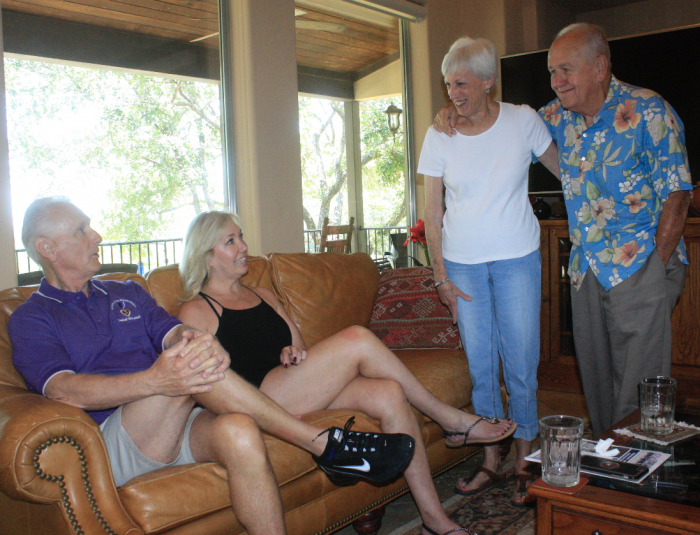Vietnam-era Marine giving back to veterans

Richard Zowie/The Highlander
Bill Hutton and his girlfriend Gina Ciauri (left) visit with longtime friends and Marble Falls residents Jack and Cathy Harris, right. Hutton keeps in close touch with the Harris’ son, Jeff, who currently serves in the U.S. Marines.
By Richard Zowie
The Highlander
Many Marines served in the Vietnam War. Some did not return home.
Bill Hutton was among those who returned.
He did his tour of duty as a rifelman in 1966 and returned home with several citations, including three Purple Hearts, four Vetnam Crosses of Gallantry (one personal and three units) and a Silver Star (the third-highest award the U.S. military gives for valor in combat).
“I’ll tell people I’m on borrowed time,” he said, remembering fellow Marines who were killed in Vietnam.
“I say that I should’ve died in 1966. but it was those things you never know…you’re very fortunate to come home.”
Following his Marine service and retired as a detective sergeant with the Los Angeles County Sheriff’s Department, the Thousand Oaks, California, native now serves as senior vice president of the Purple Heart Foundation and helps raise funds for all service members.
The Purple Heart Foundation is the fund-raising engine of the Military Order of the Purple Heart. It raises funds to support the Order’s programs and services.
Through grants and outreach programs, the foundation lends support to other organizations whose programs align with their mission.
They make smakker, direct contributions to veterans facing exceptionally difficult financial challenges and help veterans transition back into civilian life.
“I became more active in the organization when I retired in 2003,” Hutton said.
“I moved up the chain of command through Purple Heart up to the national position in 2011.”
Hutton was recently in Marble Falls visiting with longtime friends Jack and Cathy Harris. He is often in touch with their son Jeff, who currently serves in the U.S. Marines.
“He was the role model for our son wanting to go into the Marine Corps,” said Cathy Harris. “They’ve been so close and remain so close. They talk all the time and text. They’re just like brothers. All Marines are like that.”
Hutton described the foundation as a fraternal one that where every member is combat wounded.
“We’ve stayed active in both peacetime and war time,” said Hutton, who previously served as national commander of the Military Order of Purple Heart.
“We deal with veterans, veteran issues and veteran families. We’re congressionally chartered as a service organization, and we provide about 56 service officers throughout the nation in different locations with administrative assistance. We assist them with their service disconnected disabilities, educational benefits and health benefits. We do it for members of all services: combat and non-combat.”
Hutton said that in their fiscal year 2016, they assisted 18,000 veterans in getting about $293 million in lifetime benefits.
They also have a scholarship program that gives about $200,000 a year to 83 scholarships annually for Purple Heart recipients and their family members.
To donate, go to www. purpleheartfoudnation.org and press the purple button.
Marine in Vietnam
Vietnam was on the mind of many American high school students who graduated in the mid to late 1960s, including Hutton. He decided to join the USMC after looking at all the services and then looking at copies of Leatherneck Magazine.
“I saw pictures of Marine uniforms and decided that was the branch I wanted to serve in,” Hutton said.
Before boot camp, Hutton already knew how to break down an M-14 rifle and knew all his general orders. He felt knowing these would help himconcentrate on other tasks.
“They break you down and give everybody those haircuts, everybody dresses the same, to get you on bottom level and then build you up as a Marine,” he said. “That’s when you start working as a team. You’re not going to Vietnam or to a combat zone as an independent ‘I’ person, or else, you’ll die. You have to be able to work together and know the next person has your back.”
Even during boot camp in San Diego, Hutton knew he’d go to Vietnam.
“You have that feeling when there’s a war in progress — especially when it’s 1965 or 1966 when things starting to heat up,” he said. “I remember my drill instructor went through list of MOS’s [Military Occupational Specialties] of everybody in the platoon. When they came to me, he said, “You’re going to be a 0311 [Rifleman]. He told me, ‘Congratulations. You’ll have 11 seconds to live once you hit the beach.”
Like many service members, Hutton wasn’t aware at first what the war in Vietnam as about.
“I was told we needed to keep communism out of the United States, and this is where I needed to start. They gave me a rifle, bayonet, a good pair of boots and sent me on my way.”
For Hutton, there are times he’ll marvel at his military career and wonder what he did to deserve coming home.
“Nobody comes home the same, when they’ve been in a combat zone. The other thing is you have that survivor remorse. I think everybody goes through that, where you say, ‘How come him and not me?’ That’s how it is, the luck of the draw. You try to be thankful, continue on and proceed.”
His time in the Corps helped him build many friendships that continue to this day. One friend of his is R. Lee Ermey, a Marine best known as playing Gunnery Sgt. Hartman in the 1987 Stanley Kubrick lm Full Metal Jacket.
“He lives about 25 miles away from me,” said Hutton.

